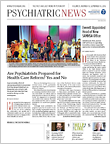Children from infancy through age 18 need specific amounts of sleep to achieve optimal mental and physical health, according to a consensus panel convened by the American Academy of Sleep Medicine (AASM).
Regularly obtaining the recommended number of hours of sleep benefits youngsters’ attention, behavior, learning, memory, emotional regulation, quality of life, and overall health, the AASM panel concluded.
Habitually sleeping fewer than the recommended number of hours is associated with problems in the same areas as well as an increased risk of accidents and injuries, the 13-member panel found.
Regularly getting less than or more than the optimal hours of sleep, the panel said, is also associated with other adverse outcomes, including hypertension, obesity, diabetes, and depression.
To reach its conclusions, the panel evaluated evidence from 864 scientific publications on sleep duration and health in pediatric populations, panel chair Shalini Paruthi, M.D., told Psychiatric News. Paruthi is an adjunct associate professor of internal medicine and pediatrics at St. Louis University School of Medicine and co-directs the sleep medicine and research center at St. Luke’s Hospital in St. Louis.
Panelists reviewed more than 100 reports on sleep duration and mental health, as well as studies pertaining to general health, cardiovascular health, metabolic health, immunologic function, developmental health, and human performance.
Most studies were based on cohort or cross-sectional studies of community-based populations. They suggest associations, Paruthi noted, but do not establish causality. Information on children’s sleep duration and other health measures generally came from parental or self-reports. Some studies confirmed total sleep time with a wrist-worn activity monitor, and a few used laboratory-based sleep monitoring.
In the mental health domain, longitudinal studies showed children who slept poorly and obtained less than average amounts of sleep in their first year or two of life had more difficulties with emotional, social, and behavioral functioning than their typically sleeping peers did several years later, according to parental reports on validated questionnaires.
Studies of children aged 6 to 13 years commonly focused on associations between total sleep duration and affect, emotional regulation, irritability, peer/family relations, and perceived health. These studies helped define hours of sleep associated with positive or negative outcomes in such areas.
“The most compelling data on associations between sleep duration and emotional health came from studies of adolescents,” the panel’s mental health co-chair, Kiran Maski, M.D., told Psychiatric News. Maski, an instructor in neurology at Harvard Medical School, directs the sleep/neurology clinics at Boston Children’s Hospital.
In a survey of nearly 28,000 public school students in grades 8, 10, and 12 in Fairfax County, Virginia, in 2009, for example, high-school students reported averaging 6.5 hours sleep on school nights. About 20 percent of students said they typically slept less than five hours a night. Only 3 percent said they slept the optimal nine hours on average.
With every less hour of sleep that students got on average on a typical weekday, the odds rose significantly that the students reported that, in the past year, they had felt sad or hopeless for two weeks or more, seriously considered suicide, made a suicide attempt, and used alcohol, tobacco, marijuana or other illicit substances.
The small percentage of students who said they usually slept 10 hours or more also had higher odds of suicidal thoughts and behavior.
“This U-shaped curve, with emotional distress tied to both too little and too much sleep, deserves further attention,” Maski said. Suicide is the third leading cause of death in adolescents.
Survey results helped convince the Fairfax County (Virginia) School Board to delay high school start times from 7:20 a.m. to between 8 a.m. and 8:10 a.m., starting in the 2015-2016 school year.
Concerns about adverse effects of insufficient sleep in adolescents have sparked a nationwide grass-roots advocacy movement to start schools later.
After their review, panel members discussed and voted on a range of evidence-based hours of sleep for each age group. They presented their recommendations at the joint annual meeting of the American Academy of Sleep Medicine and the Sleep Research Society in Denver this summer. The panel’s report will be published in the Journal of Clinical Sleep Medicine later this year. The American Academy of Pediatrics has endorsed the AASM’s recommendations.
Funding for the panel’s work came from the National Healthy Sleep Awareness Project, a partnership between AASM, the Sleep Research Society, and the Centers for Disease Control and Prevention, to promote the nation’s sleep health.
The pediatric guidelines serve as a companion to AASM’s 2015 recommendation that adults aged 18 to 60 years obtain seven or more hours a night for optimum health (
Psychiatric News, September 18.). ■
An abstract of “Recommended Amount of Sleep for Pediatric Populations: A Consensus Statement of the American Academy of Sleep Medicine” can be accessed
here.

